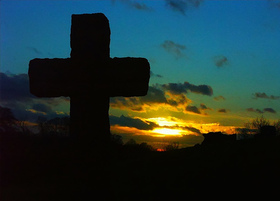I remember the first time that I realized that “Abide With Me” was really based on the disciples on the Road to Emmaus who get to their homes not knowing that Jesus was with them all along and they say “Abide with us, fact falls the eventide”. I have always loved the hymn.
It seems even more fitting that we sang “Abide with Me” at Dean Hartley’s funeral after reading the history of the hymn written by Richard Niell Donovan. You can hear a portion of the hymn by going to …….
.https://www.facebook.com/photo.php?v=10151966030924253
Abide with Me
Henry Francis Lyte (1793-1847) was an Anglican clergyman who served nearly half his life as vicar of a church at Brixham, a fishing village in Devonshire, on the southwest coast of England (he died at the age of 54, and served that congregation for 24 years).
Lyte had shown promise as a poet even as a child, and wrote religious poetry and hymns throughout his life. However, it was only near the end of his life that he wrote the hymn that would make him famous –– “Abide with Me.”
During the last years of his life, Lyte suffered from tuberculosis, the disease that would eventually take his life. A few weeks before his death, he preached his last sermon at Brixham. He rested that afternoon, and upon arising took a walk on the beach. He then retired to his study, and emerged with his poem, “Abide with Me,” in his hand.
It seems clear that death was on his mind as he took his walk that afternoon. He was leaving the Brixham congregation because his poor health would no longer permit him to carry on an active ministry there. It must have been clear to him that he was dying. And so he wrote:
“Abide with me: fast falls the eventide; The darkness deepens; Lord with me abide;
When other helpers fail and comforts flee, Help of the helpless, O abide with me.”
The poem is lovely in both language and sentiment –– but it seems odd that a hymn about death could become as popular as this one. But on closer observation, the reason seems clear. This hymn speaks to us, not only about death, but also about life. It assures us of God’s presence and help in life and in death. As it says in the last line of the last verse:
“In life, in death, O Lord, abide with me.”
“In life, in death!” It is not just in death that we need the Lord, but in life as well. And so, when we sing this hymn, we repeat again and again, “Abide with me” –– a prayer for God’s presence and a prayer for God’s help.
–– Copyright 2007, Richard Niell Donovan


